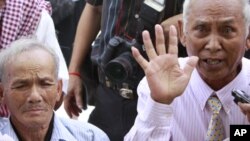Chum Mey, an 82-year-old survivor of the Khmer Rouge, sits on a plastic chair outside his book kiosk, in the courtyard of the former prison that once held him. He sells books about the Khmer Rouge, and about himself, in what is now called the Tuol Sleng Genocide Museum.
He says he is now waiting to hear a verdict from the UN-backed Khmer Rouge tribunal for two former leaders of the regime, Nuon Chea and Khieu Samphan. The court is expected to announce that verdict Aug. 7.
“I’m happy to see there will be a verdict,” he says. “The entire world is waiting for it too.”
Nuon Chea and Khieu Samphan face charges for atrocity crimes, including genocide, committed by the Khmer Rouge under their leadership. The first phase of their trial focused on the forced exodus of Phnom Penh, in 1975.
Chum Mey was part of that exodus. “I can’t forget that evacuation,” he says. “I slept near a dead body.”
The tribunal has sentenced just one Khmer Rouge defendant, Comrade Duch, who received life in prison for his role as supervisor of the Tuol Sleng detention center.
Khmer Rouge survivor Bou Meng says anything less for Nuon Chea and Khieu Samphan will be too little. They gave orders to lower-level cadre, Chum Mey says. And if Duch was given life, “they cannot be sentenced for 20 or 30 years in prison,” he says.
Tribunal officials say they feel sure justice will be delivered.
“It will be justice not only for victims, but for the accused,” says Lars Olsen, a spokesman for the international side of the hybrid court. “It means we are going forward to achieve our mandate.”
Following next month’s verdict, the second and final phase of the trial is expected to begin. That won’t be until later in the year.
“This verdict is crucial for historical justice of humanity,” says Phay Siphan, a spokesman for the Cambodian government.
But for Youk Chhang, the head of the Documentation Center of Cambodia, which conducts genocide research crucial to the trial, the completion of the trials should not overshadow a larger failure
“The world has failed to prevent over the last 60 years,” he says. “When you cannot prevent any genocides in the world, we cannot shout that we’ve had success.”







